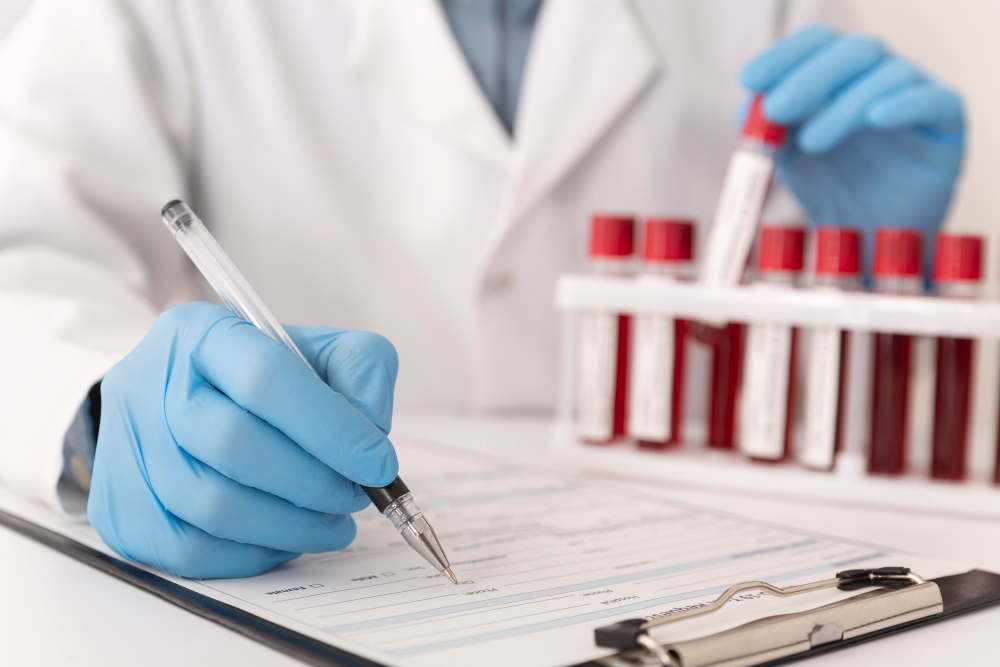- Fast results
- 4,000+ locations
- 4.8 star rating
Need Help? (888) GET LABS


This article is Medically Approved ✓ by Dr. Edward Salko

HIV or human immunodeficiency virus infection remains one of the sexually transmitted diseases (STD) that strikes instant fear to any person’s heart.
The stigma on HIV may have subsided over the years, but the lack of cure calls for extra precaution against it.
Nonetheless, despite the absence of definitive treatment, patients with HIV continue to live if they manage the condition well. They can have an expected lifespan with an average life expectancy of up to 70 years.
In this sense, early diagnosis is a critical step for the treatment process of HIV infection.
The procedure for HIV tests is relatively simple. Once you go to an HIV testing facility near you, a sample of your blood will be drawn by a phlebotomist or a medical diagnostician.
Aside from a blood sample, oral fluids will also be obtained from swabbing your cheek cells. Both samples are used for the screening process.
At-home HIV testing is available. However, if you wish to have more accurate results free of human error, it is still best to let professionals give you a hand.
If you are concerned with your privacy and anonymity, there are proven ways to protect them.
And as the National HIV Testing is observed on June 27, it is fitting to have a clear understanding of how to get tested for HIV.
Although cases of HIV infections in the US have significantly dropped over the decades, the disease remains active in several subpopulations.
Records of HIV incidences were seen to decrease by 8% between 2015 to 2019. And according to the CDC, the most prevalent cases of HIV, accounting for 69% of new diagnoses, are among gay, bisexual, and other men who engage in sexual activities with other men.
Nonetheless, if you take aside the significant progress in the prevalence of HIV, one thing that should drive anyone to get tested for the infection is the severity of its final stage.
Of course, we are pertaining to the life-threatening condition that shook the entire world to its core: AIDS.
Acquired immunodeficiency syndrome (AIDS) is the end game of HIV infection. However, it is essential to point out that not everyone with HIV is bound to have AIDS.
Years of research led to the introduction of antiretroviral therapy that allows patients to regain their sense of normalcy despite carrying the infection.
Still, AIDS is a serious condition that compromises the immune system. HIV attacks the CD4 cells that make immune cells unable to stop infections. As a result, a person with AIDS can easily succumb to the fatal effects of other diseases like pneumonia.
Even if you are not sexually active, a wide perspective and basic knowledge on HIV are still encouraged. People around you could always benefit from what you know.
On the other hand, if you engage in sexual activities frequently or with multiple partners, it is imperative that you don’t just settle for the knowledge. Get tested for HIV.

An HIV test should be a routine procedure.
According to the CDC, you should get tested for HIV at least once, whether you find yourself at risk or not. This applies to individuals aged 13 to 64. The frequency increases if you’re sexually active.
Furthermore, you should get an HIV test if you have been exposed to a person diagnosed with the infection. Here are known ways wherein HIV can be transmitted:
1. Unprotected sex
2. Sharing injecting devices
3. Transfusions involving contaminated blood
4. Mother-to-child transmission during pregnancy
5. Birth and breastfeeding
You can get tested for HIV in health centers, community clinics, family planning clinics, your local health department, or through your healthcare provider.
Likewise, HIV testing can also be arranged online.
You can order an HIV Screening Blood Test here at Personalabs. You won’t only get the testing set up in a partner laboratory near you, but you will also be given proper guidance once the results come positive.
When the antiretroviral treatment is started in the earlier phase of the infection, the serious effects of HIV are inhibited.
Therefore, early diagnosis has been dubbed as an effective tool for AIDS prevention. However, there is no current method to detect HIV as soon as infection or exposure occurs.
Results of the HIV test varies on the type of testing performed. Nonetheless, these tests are accurate regardless of nature. Here are the recommended types of HIV testing.
With this type of test, antibodies responding to HIV are detected. The immune system produces antibodies during an infection.
Samples of blood or oral fluid are collected. Antibody tests can detect HIV infection within 23 to 90 days after exposure.
In an antigen/antibody test, aside from the antibody, the test also screens for the antigen called p24. This antigen is produced when HIV has entered the body system. Blood samples for this test are taken from the vein. It detects HIV infection after 18 to 45 days of exposure.
Unlike the other two tests, NATs screen for the actual virus. It can detect infection after 10 to 33 days of exposure. NATs are pretty expensive; hence, they are mostly recommended for individuals who have high exposure to the virus.
Knowing the result of your HIV testing can be worrisome. When you go to a laboratory, your results are released in the same facility.
On the other hand, if you opt to have online HIV testing, you can view your results on your account.
The privacy of the testing and the result is often a critical factor in deciding to get tested for HIV. The controversy surrounding the condition still affects how people perceive HIV.
Nonetheless, healthcare providers and medical laboratories recognized this demand. Hence, people can opt to go through either anonymous testing or confidential testing.
Anonymous testing is wherein you take the test without divulging your identity. No even during the release of the results. You will be assigned an identifier which you will use throughout the testing process.
On the other hand, confidential testing means that you provide your basic information during the test.
Likewise, the result will bear your name, and it will be included in your medical records. The said document will only be released with your permission.
HIV tests are generally accurate. In fact, the accuracy rate for HIV tests falls from 99% to 100%.
It is expected that your gynecologist may require HIV testing during your pregnancy, considering that the virus can be passed on from the mother to the child.
The transmission of the virus can occur within the intrauterine life of the fetus. It can also occur during childbirth or breastfeeding.
HIV testing can only confirm the infection. It can’t tell if the person’s degree of infection has progressed to AIDS.
Once the laboratory test verifies the HIV infection, another set of tests can be carried out to assess the progression of the virus. These include the HIV Viral Load Test and the CD4 T-Cell Count Blood Test.
If you get a non-reactive HIV test, it means that no HIV-related antibodies were found in your sample. Generally, it suggests that you don’t have an HIV infection.
Getting tested for HIV is a crucial way to save your health and stop its spread. Scary as it may seem, taking the simple procedure can give you a better chance to prevent the infection from aggravating into AIDS.
If you are not sure how to secure an HIV testing near you, then consider checking out Personalab’s HIV Screening Blood Test.
Once you create an account with Personalab’s, you can order the HIV test, and the procedure will be arranged in a partner laboratory near you.

© Copyright 2025 Personalabs. All Rights Reserved.